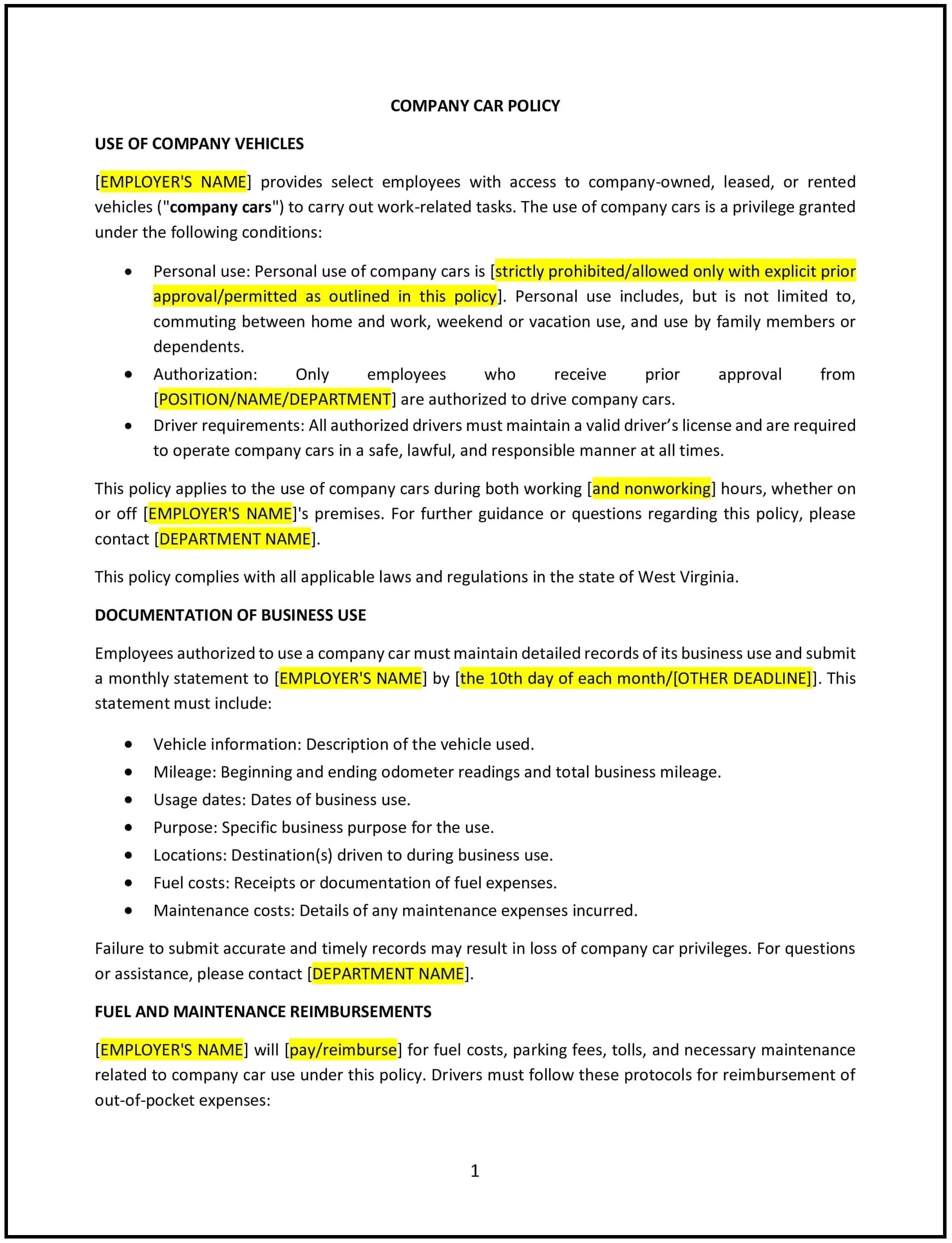Got contracts to review? While you're here for policies, let Cobrief make contract review effortless—start your free review now.

Customize this template for free
Company car policy (West Virginia)
A company car policy helps West Virginia businesses establish clear guidelines for employees who are provided with a company vehicle for work-related tasks. This policy outlines the responsibilities of both the company and employees regarding the use, maintenance, and insurance of company cars, ensuring that the vehicles are used appropriately and safely.
By implementing this policy, businesses can ensure that company vehicles are used for legitimate business purposes, minimize liability, and promote efficient operations.
How to use this company car policy (West Virginia)
- Define eligibility: Specify who is eligible to receive a company car, such as employees in certain roles (e.g., sales, management), or employees who are required to travel as part of their job.
- Set acceptable use: Outline the acceptable uses for the company car, such as driving to client meetings, transporting goods, or commuting between job sites. Clarify any restrictions on personal use, including whether employees can use the vehicle for commuting to and from work or for non-business purposes.
- Establish maintenance responsibilities: Specify who is responsible for maintaining the company car, including regular servicing, repairs, and keeping the vehicle clean. This can be the responsibility of the employee or the company, depending on the policy.
- Address insurance coverage: Clarify the type of insurance coverage provided for the company car, including liability, collision, and comprehensive coverage. Specify if the employee is responsible for paying deductibles or for any damages caused during personal use.
- Provide guidelines for accidents or damage: Set procedures for reporting accidents, damage, or theft of the company car, including how employees should handle these situations, the timeline for reporting, and any consequences for failing to report damage promptly.
- Outline fuel and expense guidelines: Specify how fuel and other vehicle-related expenses (e.g., tolls, parking) will be managed. Determine if employees will be reimbursed for fuel costs or if a company credit card will be provided for fuel purchases.
- Set return procedures: Establish procedures for returning the company car, including when an employee leaves the company or changes roles. This may include a requirement for employees to return the vehicle in good condition, with any required documentation or keys.
Benefits of using this company car policy (West Virginia)
This policy offers several benefits for West Virginia businesses:
- Ensures proper vehicle use: By setting clear guidelines, the policy helps ensure that company cars are used for business purposes and are not misused for personal reasons.
- Reduces liability: Clear rules for maintenance, accidents, and insurance help mitigate risks related to vehicle use and protect the business from potential liability claims.
- Promotes efficiency: Company cars make it easier for employees to travel for work-related tasks, ensuring that they have reliable transportation to meet the needs of the business.
- Protects company assets: By establishing procedures for maintaining and returning vehicles, businesses can ensure that their assets remain in good condition and are returned when no longer needed.
- Supports employee mobility: Offering company cars to eligible employees can be an attractive benefit that supports their ability to perform their job efficiently, particularly for roles that require travel.
Tips for using this company car policy (West Virginia)
- Communicate the policy clearly: Ensure that all employees eligible for a company car understand the policy guidelines, responsibilities, and expectations related to car use, maintenance, and insurance.
- Provide regular vehicle checks: Schedule regular inspections and maintenance of company cars to ensure they are in good working condition and comply with safety standards.
- Track vehicle use: Monitor the usage of company cars, including mileage, fuel consumption, and personal use, to ensure compliance with the policy and avoid misuse.
- Offer employee training: Provide employees with training on the proper use of company cars, including safe driving practices, reporting accidents, and the company’s procedures for handling vehicle-related expenses.
- Review regularly: Periodically review the policy to ensure it remains aligned with company needs, employee feedback, and changes in West Virginia laws or business practices.